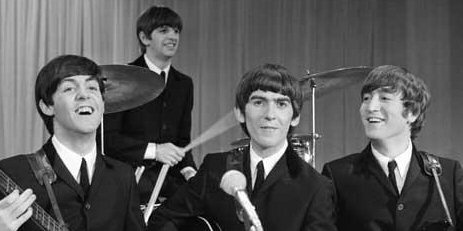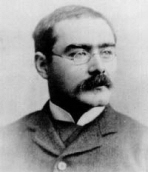 |
Rudyard Kipling (1865-1936), author of the "Jungle Book".
The height of Kipling's popularity was the first decade of the 20th century: in
1907, he was awarded the Nobel Prize for Literature and still remains its
youngest-ever recipient, as well as the first English language writer to receive
the prize. In his own lifetime he was primarily regarded as a poet, and was
offered a knighthood and the post of British poet laureate, though he turned
them both down. |
|||||||||
 |
Sir Winston Leonard Spencer-Churchill (1874–1965), was a British politician and author, best known as Prime Minister of the United Kingdom during the Second World War in which he led the nation, standing alone against Hitler, to a great victory. Well known as orator, strategist, soldier, author and politician, Churchill is generally regarded as one of the most important leaders in modern British and world history. The philosophy of moral bombing orginated with Churchill, which posits the idea that the sacrifice of innocent civilians is morally acceptable, if done for the greater good. He won the 1953 Nobel Prize in Literature for his many books on English and world history. Sir Winston Churchill was voted the Greatest-ever Briton in the 2002 BBC poll the 100 Greatest Britons. |
|||||||||
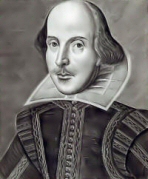 |
William Shakespeare (1564–1616) was an English poet and playwright widely regarded as the greatest writer of the English language, as well as one of the greatest in Western literature, and the world's pre-eminent dramatist. He wrote about thirty-eight plays and 154 sonnets, as well as a variety of other poems. Already a popular writer in his own lifetime, Shakespeare's reputation became increasingly celebrated after his death and his work adulated by numerous prominent cultural figures through the centuries. In addition, Shakespeare is the most quoted writer in the literature and history of the English-speaking world. He is often considered the English national poet and is sometimes referred to as the "Bard of Avon" (or simply "The Bard") or the "Swan of Avon". |
|||||||||
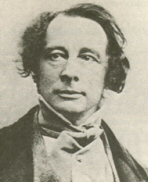 |
Charles John Huffam Dickens (1812–1870), pen-name "Boz", was an English novelist. During his career Dickens achieved massive worldwide popularity, winning acclaim for his rich storytelling and memorable characters. Considered one of the English language's greatest writers, he was the foremost novelist of the Victorian era as well as a vigorous social campaigner. Major novels: Oliver Twist (1837–9); David Copperfield (1849–50) |
|||||||||
 |
Sir Isaac Newton (1642-1727), founder of modern physics, inventor of the reflector telescope. He also sat in parliament on two occasions, was elected president of the Royal Society in 1703, and was knighted in 1705. Newton is generally regarded as one of the greatest scientists and mathematicians in history and was one of the greatest lay theologians of his age. |
|||||||||
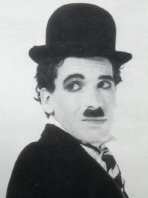 |
Sir Charlie Chaplin (1889-1977) was one of the most creative and influential personalities in the silent film era: he acted in, directed, scripted, produced, and eventually even scored his own films. His working life in entertainment spanned over 70 years, from the British Victorian stage and music hall in England as a child performer, almost until his death at the age of 88. He led one of the most remarkable and colourful lives of the 20th century, from a Dickens-like London childhood to the pinnacle of world fame in the film industry and as a cultural icon. |
|||||||||
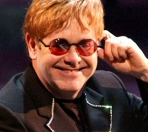 |
Sir Elton John (b. 1947) Rock singer and pianist. He has produced many hit albums and a recording of ‘Candle in the Wind ’97’, sung at the funeral of Princess Diana. He was knighted in 2005. |
|||||||||
|
Beatles, British pop group, formed in Liverpool in 1960. 'Beatlemania’ spread around the world in 1964, buoyed by international hits such as ‘She Loves You’ and ‘I Want to Hold Your Hand’, and by the overwhelming success of a concert tour in American stadiums. The group dissolved acrimoniously in 1970.
Other famous English bands and musicians:
|
||||||||||
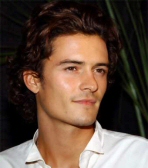 |
Orlando Bloom (b. 1977) Actor; The Lord of the Rings trilogy (2001–3). Other films include Black Hawk Down (2001), Pirates of the Caribbean (2003), Troy (2004), and Kingdom of Heaven (2005). |
|||||||||
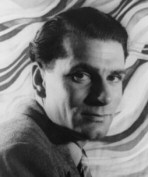 |
Laurence Kerr Olivier (1907–1989) was an Academy Award winning English actor, Academy Award nominated director, and an Academy Award winning producer. He was regarded by many critics as the greatest actor of the 20th century. His career stretched over several decades, prolific both on stage and in film. In both media, he played a wide variety of roles, from Othello to a Nazi dentist. He was knighted in 1947, and created a life peer in 1970. |
|||||||||
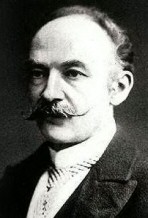 |
Thomas Hardy (1840–1928) was a novelist, short story writer, and poet of the naturalist movement, who delineated characters struggling against their passions and circumstances. The bulk of his work, set mainly in the semi-imaginary county of Wessex, is marked by poetic descriptions, and fatalism. |
|||||||||
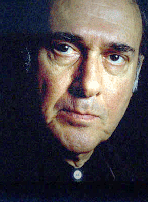 |
Harold Pinter (1930–) is a British playwright, director, actor, poet, and political activist. He has written works for theater, radio, television and film. The recipient of scores of awards and honorary degrees, he was awarded the Nobel Prize in Literature in 2005. |
|||||||||
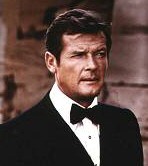 |
Sir Roger George Moore (1927-) is an English actor known for his suave and witty demeanor. He is best known for portraying two fictional British action heroes, Simon Templar in the television series The Saint from 1962 to 1969, and, as Sean Connery's successor, James Bond in the successful film series from 1973 to 1985. He has been a UNICEF ambassador since 1991. He was knighted in 2003. |
|||||||||
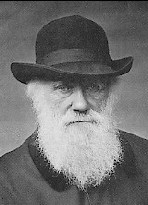 |
Charles Robert Darwin (1809–1882) was a British naturalist who achieved lasting fame by producing considerable evidence that species originated through evolutionary change, at the same time proposing the scientific theory that natural selection is the mechanism by which such change occurs. This theory is now considered a cornerstone of biology. |
|||||||||
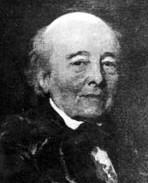 |
John Nash (1752–1835) was an English architect responsible for much of the layout of Regency London. His projects included: Regent's Park St. Jame's Park Trafalgar Square Buckingham Palace |
|||||||||
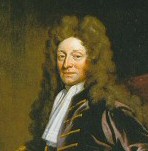 |
Sir Christopher Wren (1632–1723) was an English scientist and architect of the 17th century, most famous for his role in the re-building of London's churches (e.g. St Paul's Cathedral) after the Great Fire of London of 1666. |
|||||||||
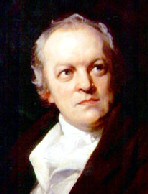 |
William Blake (1757–1827) was an English poet, painter, and printmaker. Though largely unrecognised during his lifetime, today Blake's work, produced in partnership with his wife Catherine, is widely known. According to Northrop Frye, who undertook a study of Blake's entire poetic opus, his prophetic poems form "what is in proportion to its merits the least read body of poetry in the [English] language". Others have praised Blake's visual artistry, in particular his engravings: "[Blake] is far and away the greatest artist Britain has ever produced". |
|||||||||
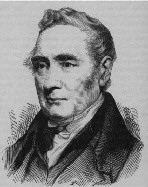 |
George Stephenson (1781–1848) was an English mechanical engineer who designed the famous and historically important steam locomotive named Rocket and is known as the "Father of Railways". The Victorians considered him a great example of diligent application and thirst for improvement. His rail gauge of 4 ft 8½ in (1435 mm), sometimes called "Stephenson gauge", is the world's standard gauge. |
|||||||||
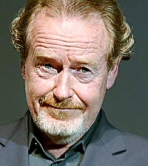 |
Sir Ridley Scott (1937-) is an influential British film director and producer. He was knighted in the 2003 New Year Honours. Some of his released films: Kingdom of Heaven (2005) Black Hawk Down (2001) Gladiator (2000) 1492: Conquest of Paradise (1992) Blade Runner (1982) Alien (1979)
|
|||||||||
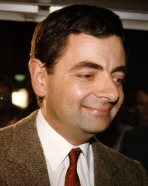 |
Rowan Sebastian Atkinson (1955-) is an English comedian, actor and writer best known for playing the title roles in the British television comedies Blackadder and Mr. Bean. |
|||||||||
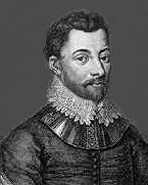 |
Sir Francis Drake (1540–1596) was an English privateer, navigator, naval pioneer and raider, politician and civil engineer of the Elizabethan era. He was the first captain to circumnavigate the Earth (Magellan died on his voyage). He was second-in-command of the English fleet against the Spanish Armada in 1588. He died of dysentery while unsuccessfully attacking San Juan, Puerto Rico in 1596. |
|||||||||
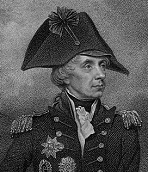 |
Horatio Nelson (1758–1805) was a British admiral famous
for his participation in the Napoleonic Wars, most notably in the Battle of
Trafalgar, where he lost his life. He became the greatest naval hero in the
history of the United Kingdom, and is one of the most famous naval
commanders in world history. His biography by the poet Robert Southey
appeared in 1813, while the wars were still being fought. He was knighted in
1797. He is honoured by the London landmark Nelson's Column, which stands in
Trafalgar Square. |
|||||||||
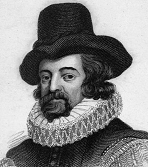 |
Francis Bacon (1561–1626) was an English philosopher, statesman and essayist but is best known for leading the scientific revolution with his new 'observation and experimentation' theory which is the way science has been conducted ever since. He began his professional life as a lawyer, but he has become best known as a philosophical advocate and defender of the scientific revolution. His works establish and popularize an inductive methodology for scientific inquiry, often called the Baconian method. Induction implies drawing knowledge from the natural world through experimentation, observation, and testing of hypotheses. |
|||||||||
 |
John Locke (1632– 1704) was an influential English philosopher. In epistemology, Locke has often been classified as a British Empiricist, along with David Hume. He is equally important as social contract theorist and he developed an alternative to the Hobbesian state of nature and argued a government could only be legitimate if it received the consent of the governed through a social contract and protected the natural rights of life, liberty, and estate. If such consent was not given, argued Locke, citizens had a right of rebellion. Locke is one of the few major philosophers who became a minister of government. |
|||||||||
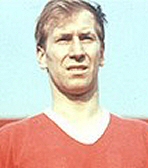 |
Sir Robert "Bobby" Charlton (1937-) is a former English professional football player who won a World Cup medal and the European Footballer of the Year award in 1966. He played almost all of his club football at Manchester United. He scored 49 international goals for England and 247 goals for Manchester United. He received a knighthood in 1994. |
|||||||||
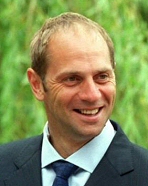 |
Sir Stephen Geoffrey Redgrave (1962-) is a British
rower who won a gold medal at five consecutive Olympic Games from 1984 to
2000. Only four other Olympians achieved the same: Pál Kovács (fencing),
Aladár Gerevich (fencing), Reiner Klimke, and Birgit Fischer ( |
|||||||||
 |
Captain James Cook (1728–1779) was an English explorer, navigator and cartographer. He made three voyages to the Pacific Ocean, accurately charting many areas and recording several islands and coastlines on European maps for the first time. His most notable accomplishments were the British discovery and claiming of the east coast of Australia; the European discovery of the Hawaiian Islands; and the first recorded circumnavigation and mapping of Newfoundland and New Zealand. |
|||||||||
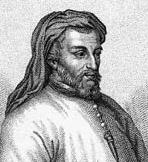 |
Geoffrey Chaucer (1343-1400) was an English author, poet, philosopher, and diplomat. He is often referred to as the Father of English Literature. Although he wrote many works he is best remembered for his unfinished frame narrative The Canterbury Tales. He is sometimes credited with being the first author to demonstrate the artistic legitimacy of the vernacular English language, rather than French or Latin. |
|||||||||
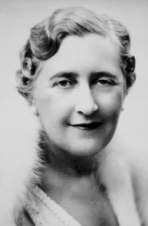 |
Agatha Mary Clarissa (1890–1976), better known as
Agatha Christie, was an English crime fiction writer.
Agatha Christie is the world's best-known mystery writer and, apart from
William Shakespeare, is the all-time best-selling author of any genre. Her
books have sold over two billion copies in the English language and another
billion in over 103 foreign language. She is famously known as the
'Queen of Crime' and is perhaps the most important and innovative writer in
the development of the English mystery novel. |
|||||||||
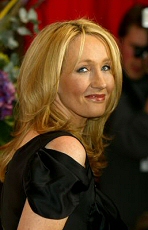 |
Joanne "Jo" Rowling (1965-) is a British fiction writer who writes under the pen name of J. K. Rowling. Rowling became famous as author of the Harry Potter fantasy series, which has gained international attention, won multiple awards, and sold over 300 million copies worldwide. In February 2004, Forbes magazine estimated her fortune at £576 million (just over US$1 billion), making her the first person ever to become a $US billionaire by writing books. |
|||||||||
 |
John Ronald Reuel Tolkien (1892–1973) is best known as
the author of The Hobbit and its sequel The Lord of the Rings. He was a
professor of Anglo-Saxon language at Oxford from 1925 to 1945, and of
English language and literature, also at Oxford, from 1945 to 1959. He was a
strongly committed Roman Catholic. Tolkien was a close friend of
C. S. Lewis. |
|||||||||
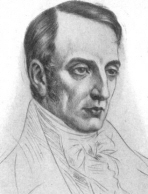 |
William Wordsworth (1770–1850) was a major English romantic poet who, with Samuel Taylor Coleridge, helped launch the Romantic Age in English literature with their 1798 joint publication, Lyrical Ballads. Wordsworth's masterpiece is generally considered to be The Prelude, an autobiographical poem of his early years that was revised and expanded a number of times. It was never published during his lifetime, and was only given the title after his death. Wordsworth was England's Poet Laureate from 1843 until his death in 1850 (a poet officially appointed by a government and often expected to compose poems for state occasions and other government events). |
|||||||||
